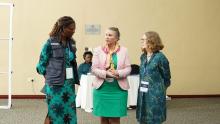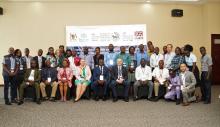Uganda trains Community Health workers from Kole, Mukono and Wakiso districts on community-based approach to Ebola
Entebbe. Uganda’s Ministry of Health has conducted a training on Ebola disease detection and management for Community Health Worker representatives from Kole, Wakiso, and Mukono districts. The training also focused on developing the Ebola Community Health Workers curriculum. By leveraging community structures and assets, this initiative aims to enhance Uganda’s ability to prevent, detect, and respond to health emergencies.
The three-day event was supported by World Health Organization (WHO), and the UK Public Health Rapid Support Team (UK-PHRST). The UK-PHRST is a UK aid project funded by the Department of Health and Social care.
Participants engaged in discussions focused on multi-sectoral action to safeguard communities from emerging zoonotic diseases with pandemic potential such as Ebola. The exercise underscored various challenges, such as economic downturns, lockdown-related absenteeism, system strains, public anxiety, and rampant misinformation. It also highlighted the significant roles of community volunteers, health workers, civil society organizations, the private sector, and government entities in outbreak and pandemic response.
Dr Dansan Atim, Ministry of Health Senior Medical Officer in charge of community Health, emphasized the importance of a community-based approach in responding to public health threats. “By integrating community-centered health emergency management into national policies and practices, we strengthen our ability to detect, report, and respond to public health threats early, preventing outbreaks from escalating,” he said.
The community protection approach is a central component of WHO's new Health emergency prevention, preparedness, response, and resilience (HEPR) framework. The framework is based on the principle that health emergencies begin and end in communities, necessitating robust national health systems that are accountable to those they serve and promote gender equity and human rights.
“By prioritizing community-centered policies and strategies through the community protection approach we foster greater collaboration between governments, communities, and civil society organizations. This approach ensures interventions are effective and aligned with community needs,” said Dr Kai von Harbou, Unit Head, Country Readiness and Resilience at WHO Headquarters.
Building on lessons learned from past health crises such as Ebola and COVID-19, Uganda has already made substantial advancements in emergency preparedness. Communities have played an integral role in raising awareness, supporting case identification, tracing contacts, and maintaining essential health services. The emphasis on collaboration with local leaders, volunteers, and health workers is seen as vital for effective responses to public health emergencies.
“We are delighted to have contributed our technical expertise to this community protection exercise and strategic action planning workshop alongside the World Health Organization at global, regional, and local levels, the Ministry of Health in Uganda and other partners. We hope this will help ensure Ugandan local communities are even better prepared for outbreaks,” said Dr Claire Bayntun, Head of Capacity Strengthening UK-Public Health Rapid Support Team (UK-PHRST), Honorary Professor at London School of Hygiene & Tropical Medicine (LSHTM) and Consultant for Global Public Health.
Bayntun added, “This exercise builds on our previous successful collaboration and simulation exercise in Ghana. Bringing this workshop to Uganda has further strengthened our partnerships and reinforces the benefit of these exercises, as learnings are relevant for the public health responses for communities in many countries.”





